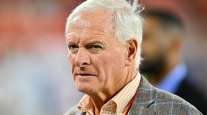53 Pilot Customers Reject Settlement, to Sue for Additional Rebate Damages
This story appears in the Oct. 21 print edition of Transport Topics.
Fifty-three out of roughly 7,000 Pilot Flying J customers eligible for a rebate-fraud class-action lawsuit settlement have formally declined to take part, the lead plaintiffs’ attorney said last week.
“The letters had to be postmarked on Oct. 15, and the number of opt outs is 53, which is infinitesimal,” attorney Don Barrett told Transport Topics on Oct. 17. “It’s a ringing endorsement of the settlement, and we’re very, very gratified about it.”
Pilot is expected to pay an estimated $50 million to the customers included in the class, said Barrett, who is based in Lexington, Miss.
Earlier estimates were for $40 million, but an extensive audit by Pilot of the 7,000 customers bumped up the payout estimate.
“I told the judge when we had our preliminary approval hearing — and I’m pretty careful what I tell a federal judge — that I’ve been practicing law for 45 years, and this is the best settlement I’ve ever gotten,” Barrett added.
Barrett said one or two more opt outs could be received through the mail, but he didn’t expect a large number to come in.
A federal judge in Little Rock, Ark., has scheduled a hearing Nov. 25 to consider final approval of the settlement.
The class-action attorneys will divide a total of $14 million of the total payout, according to the July 16 settlement agreement.
Pilot spokeswoman Anne LeZotte said that a very small percentage of eligible companies were opting out but added that Pilot would only release a final tally.
Some of those who opted out have decided to take the company to court. So far, more than two dozen diesel rebate-fraud lawsuits have been filed by Pilot customers in state and federal courts.
The lawsuits were filed after the FBI raided Pilot’s Knoxville, Tenn., headquarters in April. In a resulting 120-page bureau affidavit, the government said Pilot sales executives conspired to cheat customers out of their fuel rebates.
So far, seven executives have pleaded guilty to federal charges. Several others have been placed on administrative leave, Pilot CEO Jimmy Haslam said in a Sept. 30 news conference.
Haslam has denied knowledge of the illegal scheme.
Pilot customers who are eligible to participate in the settlement include those who purchased over-the-road diesel fuel for commercial use in Classes 7-8 vehicles and participated in Pilot Flying J “cost-plus” or “retail-minus” rebate or discount programs between Jan. 1, 2005, and July 15, 2013.
The settlement agreement requires the truck-stop chain to reimburse customers for the amount they were shortchanged, plus 6%. It does not include retail discounts given for payments made by cash, check or major credit card at the point of sale.
Shawn Organ, an attorney representing FST Express of Columbus, Ohio, said in a lawsuit filed Oct. 8 that his client chose to opt out for several reasons, including that the settlement does not allow punitive damages.
“We think that a lot of the settlement language is still subject to interpretation,” Organ told TT. “And, the feedback we’ve received from many trucking companies is that when in the past problems have been identified and numbers have been attached to those problems, they’ve been woefully inadequate.”
The settlement stipulates that Pilot auditors are to determine what the company owes customers, subject to a review by customers’ auditors.
Organ said he has opted out FST and a second party, J.F. Freight of Palatine, Ill., which recently was added to FST’s lawsuit.
John Houghtaling, a Metairie, La.-based attorney who represents Western Express, the largest carrier to file a lawsuit against Pilot, said the truckload carrier opted out because it believes it is entitled to significant punitive damages.
“Several Pilot executives have admitted fraud against Western specifically all through the FBI affidavit several times,” Houghtaling told TT. “Fraud is the key element for punitive damages. That places Western in a position that is different than some other trucking companies.”
“It is not enough legally for Pilot to say, ‘I came to your house, I broke into it, I stole things out of your safe, and I robbed you. Now that I’m caught, OK, I’ll give it back to you,’ ” Houghtaling added.
Western Express, which said it has purchased more than $1 billion in diesel fuel from Pilot from 2005 to 2013, is seeking $75.5 million for lost fees and expenses, plus up to 10 times that amount in punitive damages, Houghtaling said.
But Barrett said it’s been his experience that it’s extremely rare for a judge or jury to award punitive, or punishment, damages.
“They’re disfavored, and the courts won’t let them hold up,” Barrett said. “The plaintiffs’ lawyers may have a shot at punitive damages. But good luck to them.”
Nashville, Tenn.-based Western Express ranks No. 59 among Transport Topics Top 100 For-Hire Carriers in the United States and Canada.




